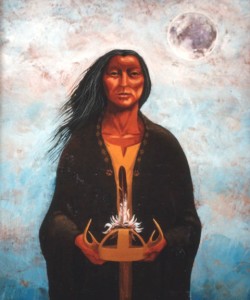older women
Broad Band – Raising Women Up Out of Invisibility
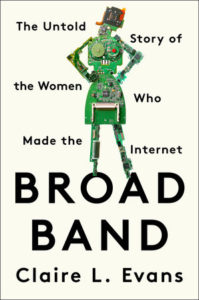 This week we saw the release of a new book chronicling a hidden segment of the female population who made important contributions to our world without most people ever realizing it. Similar to Hidden Figures, although perhaps not as dramatic as a WWII story, the women in Claire Evans’ Broad Band were creatives, science geeks, pragmatists, entrepreneurs, activists, visionaries and householders trying to make a living. They were some of the very few pioneering women who pushed out the boundaries and succeeded in the vastly male-dominated world of science and computing.
This week we saw the release of a new book chronicling a hidden segment of the female population who made important contributions to our world without most people ever realizing it. Similar to Hidden Figures, although perhaps not as dramatic as a WWII story, the women in Claire Evans’ Broad Band were creatives, science geeks, pragmatists, entrepreneurs, activists, visionaries and householders trying to make a living. They were some of the very few pioneering women who pushed out the boundaries and succeeded in the vastly male-dominated world of science and computing.
Claire takes on the daunting task of sifting through so many many stories and voices to feature just a few spanning over 100 years. She begins with ground-breakers like Ava Lovelace, Grace Hopper and the “two Betty’s” (Betty Jean Jennings and Betty Snyder). She spins the tales of “A Girl Named Jake” and tracks the women leaders through the days of the ARPANET, the early BBS’s, the dial-up’s, the emergence of the web and the world of gamers. As Claire poignently writes at the end of her book, there are hundreds of more stories to tell and women to feature – she hopes others will take up on the torch and keep giving voice to women’s contributions and stories.
I am so honored to have a few of my own stories told in Claire’s chronicle. It was a blast of a ride  to launch the first women-focused online site Women’s Wire to entice women to try out this new medium which would change our world. There were so few women online in the beginning. It was clear to me that we needed more diversity and more different kinds of voices involved in this new medium. Trying to teach women how to use computers was great fun – I was able to move from our mighty band of 1500 initial Women’s Wire subscribers to launch and mange a huge new “women’s channel” of 7,000,000 female subscribers at AOL. Once the doors opened to the Net for women, they flooded online and have never looked back.
to launch the first women-focused online site Women’s Wire to entice women to try out this new medium which would change our world. There were so few women online in the beginning. It was clear to me that we needed more diversity and more different kinds of voices involved in this new medium. Trying to teach women how to use computers was great fun – I was able to move from our mighty band of 1500 initial Women’s Wire subscribers to launch and mange a huge new “women’s channel” of 7,000,000 female subscribers at AOL. Once the doors opened to the Net for women, they flooded online and have never looked back.
As a lifelong activist and feminist, I find myself working every day now to bring my own version of justice and fairness and kindness to this population I am entering – seniors. This population too – especially senior *women* – needs to become more visible and have their voices heard. They all have rich stories – adventures, failures, successes, lessons learned that can be passed on. And this is time in our country when we can really use those voices sharing what they have learned, often the hard way, and what they have accomplished through plowing hard ground – accomplishments that often are simply taken for granted in the present time.
Although I have not yet finished Claire’s book, I look forward to reading more pages every day and learning about the amazing women who invented and contributed (and led!) in the field of computing. Some of the women are renowned to me and some I am just learning about. Again, such an honor to have a small place in this book amongst so many amazing women and kudos to Claire for taking on this challenge and giving VOICE to so many whose stories are fascinating and worthy of being told.
Octogenarians Worrying About America
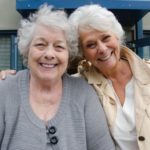 I am finding, as I continue my counseling work with older clients – those in their 80’s in particular – that there is a concern they express about the state of our U.S. government. These people have been raised with a sense of decorum, a respect for one’s character, integrity and good manners. My clients are a small pool so I don’t have a large study going on, however, their views make sense to me. That is, that the way our government behavior seems to be devolving into an angry, polarized, rude, dishonest style of treating each other and that this is something they have not seen to this degree in our country.
I am finding, as I continue my counseling work with older clients – those in their 80’s in particular – that there is a concern they express about the state of our U.S. government. These people have been raised with a sense of decorum, a respect for one’s character, integrity and good manners. My clients are a small pool so I don’t have a large study going on, however, their views make sense to me. That is, that the way our government behavior seems to be devolving into an angry, polarized, rude, dishonest style of treating each other and that this is something they have not seen to this degree in our country.
They express concern about this, yes. They worry about where the government is headed. They remember times when Democrats and Republicans disagreed heartily yet were able to work together, spend time together, even be friends despite policy differences.
The anger and polarization leads them to wonder whether our democracy can survive this. My octogenarian clients also talk about other major issues like climate change and health care and tax reform. They don’t all agree on what is to be done about these things – but they watch the behavior of America’s government and shake their heads.
They watch our president’s behavior towards leaders of other countries. Again, they were raised with the values of being courteous, polite and kind as well as strong. They are embarassed and sad that America is losing its standing in the world. Remember, this is the World War II generation – the “greatest generation” as Tom Brokaw labeled them. They have been through many years of watching American men and women fight and give their lives for these values, these truths that we hold as being “self-evident”. These are people who have studied *and lived* history. There are veterans amongst them as well.
Many of the baby boomer clients I see – in their 60’s and 70’s – are also afraid and worried. They tend, in general, to still be busy, though, with working, watching grandkids, traveling, hobbies and other distractions which take up much of their contemplative time. It is the older generation I find that is expressing the most grave and deep concern about our country.
Others may say “it was ever thus”, i.e. that older generations worry about younger generations. Although my older clients did report concern about issues during the previous administration, they are much more worried at this point.
Shouldn’t we be listening to our elders more? They remember the autocratic regimes of Hitler, Stalin, Mussolini and others. They remember the warning signs, the lead-up to widespread wars. They are heartened that Dan Rather, Carl Bernstein, many historians and people who served during the Watergate hearings are being brought out to educate and remind about those times, and to share their experiences and perspectives. Much more of that is needed.
Solutions to The Problem That Has No Name
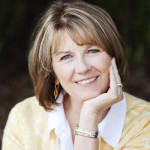 Here are, as promised, some tools that boomers are using to help keep their spirits afloat as they navigate the transition from their 60’s into their 70’s. They are simple and we mostly know about them. Putting them into regular practice is the key towards feeling better.
Here are, as promised, some tools that boomers are using to help keep their spirits afloat as they navigate the transition from their 60’s into their 70’s. They are simple and we mostly know about them. Putting them into regular practice is the key towards feeling better.
- Mindfulness, contemplation and loving kindness practices
Sitting still and paying attention. Daily. That is the gist of mindfulness practice. It doesn’t have to be for a set length of time. One minute is fine. What tends to happen is that if you can stop the momentum treadmill of everyday life even for a moment by stopping, sitting up with good posture and paying attention to your breath for one minute, you might find yourself sitting for more than one minute. The hardest thing is simply to make the effort to stop. This can be pulling over on the side of the road, in a parking lot, in your office, at your home, wherever. The word for mindfulness in an Japanese is also the word for heartfulness. This is where loving kindness practice comes in. Sitting quietly with awake presence includes paying attention to our feelings and not judging them. Letting them be, and pass by. This is a big long topic but keeping it simple, it’s about being kind towards yourself before you can begin to be truly kind to others. Repeating the simple Metta Loving Kindness mantras can be a place to start: “May I be safe, May I be happy, May I be healthy, May my heart be filled with loving kindess.”
- Exercise – aerobic; Yoga
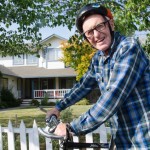 Exercise is key, we all know that. Again, even a few minutes can make a big difference both in physical health and in mental health too. A short walk around the block. A few minutes on a stationary bike. Dancing to some music on the radio. A Youtube gentle yoga video to help build muscle but also to stretch your muscles out. Most people find the most challenging part of this is getting started. So, starting by just committing to 5 or 10 minutes a day is a great way to get yourself going. Don’t start with too much of a commitment so that you give up!
Exercise is key, we all know that. Again, even a few minutes can make a big difference both in physical health and in mental health too. A short walk around the block. A few minutes on a stationary bike. Dancing to some music on the radio. A Youtube gentle yoga video to help build muscle but also to stretch your muscles out. Most people find the most challenging part of this is getting started. So, starting by just committing to 5 or 10 minutes a day is a great way to get yourself going. Don’t start with too much of a commitment so that you give up!
- Understanding the link between nutrition and mental health
More and more research is coming out about the links between good nutrition and good mental health. We are what we eat, it’s true. So many of the neurotransmitters that govern our moods are produced in the “gut”. Paying attention to what we eat – backing down the processed carbs and the white sugar is paramount to good health. Complex carbs, protein, vegetables and fruit. Simple. Fortunately we live in a day and age when good quality organic foods are available. Counting calories is an important thing to watch too. You can eat good quality foods but eat too much of them. Paying attention to your weight and aiming for a strong body are things many of our grandparents and parents knew. We need to pay attention to them too as we get older.
- Giving back to your community; volunteering
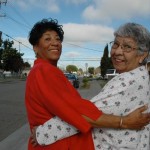 It’s not a surprise that helping others makes us feel good. People that survey volunteers at various causes always say that people report that they feel better than the people they help! As we get older and probably are retiring when we can :), people sometimes feel like now what? Traveling and doing hobbies and socializing are great – but so is having purpose and helping out our friends, family and community.
It’s not a surprise that helping others makes us feel good. People that survey volunteers at various causes always say that people report that they feel better than the people they help! As we get older and probably are retiring when we can :), people sometimes feel like now what? Traveling and doing hobbies and socializing are great – but so is having purpose and helping out our friends, family and community.
- Consciousness raising support groups
Since we are talking about a “problem that has no name”, being in a supportive peer group where we can compare notes, commiserate, exchange ideas, and yes, laugh!, can be sooo healing. There are meditation groups where people have discussions afterwards, support groups for caregivers, church/temple groups, groups that have to do with aging such as AgeSong in the Bay Area, and more. Many agencies that serve older people offer groups of various kinds, as do community centers. You might have to try one or two before you find one that feels just right.
- Nature – renewing a commitment to spending time outdoors
 There is a term in Japanese that translates as “forest bathing”. It turns out that trees release not only oxygen but also chemicals that contribute to the overall health of the forest. And, it turns out, these chemicals are very good for us humans! So, try to get out in nature, in the forest, or on the mountain, or by the ocean or river, or in the park. Anywhere where you can “forest bath” – meaning to simply stop and immerse yourself in the beauty of natural surroundings.
There is a term in Japanese that translates as “forest bathing”. It turns out that trees release not only oxygen but also chemicals that contribute to the overall health of the forest. And, it turns out, these chemicals are very good for us humans! So, try to get out in nature, in the forest, or on the mountain, or by the ocean or river, or in the park. Anywhere where you can “forest bath” – meaning to simply stop and immerse yourself in the beauty of natural surroundings.
- Counseling
Going to see a therapist who understands the journey of being in middle age and older years can be so healing and supportive. Any therapist might be helpful but particularly someone who understands that the challenges and opportunities and transitions we encounter in this adventure of growing older – can be very helpful in terms of you being able to understand what is common and normal in this part of your life. Understanding that you are not alone – you’re not doing something wrong most of the time – can feel like an unburdening. Yes you still have to figure things out and there are challenges. But the self-criticism, self-blame, and shaming can be *greatly* reduced with the power of a little education about what are called the “developmental tasks” of this age and the common landmarks of this territory. Plus, of course, learning about the many ways people like you are successfully dealing with a variety of issues is a huge help.
- Using the Arts to reconnect with Self
Re-exploring one’s love of the Arts can be so healing at this time in your life. Reading, writing, journaling, reading and writing poetry, playing a beloved instrument, learning how to play an instrument for the first time, taking a  class, learning to dance, going to art exhibits, singing in a group, going to concerts, enjoying doing crafts, arranging flowers… – all of these feed the soul and, now that you may have more time on your hands, are a good way to relax and keep your mind engaged in beauty rather than on problems. Winston Churchill, for instance, suffered greatly from depression – what he called the Black Dog. Painting, for him, was a tremendously helpful therapy.
class, learning to dance, going to art exhibits, singing in a group, going to concerts, enjoying doing crafts, arranging flowers… – all of these feed the soul and, now that you may have more time on your hands, are a good way to relax and keep your mind engaged in beauty rather than on problems. Winston Churchill, for instance, suffered greatly from depression – what he called the Black Dog. Painting, for him, was a tremendously helpful therapy.
Please feel free to email me if you have questions or comment below.
A New Year & A New Perspective
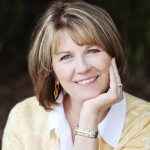 A New Year & A New Perspective
A New Year & A New Perspective
Dear friends and colleagues in the healing arts,
2015 presented me with some interesting challenges. After the death of my beloved mother and the near death and continued illness of my husband, I wondered how we healers can continue to serve our patients when we ourselves are in the midst of tough times. Maybe some of you have come up against this question too.
What I discovered is, as songwriter Leonard Cohen writes, “The birds they sang at the break of day. Start again I heard them say. Don’t dwell on what has passed away or what is yet to be. Ring the bells that still can ring. Forget your perfect offering. There is a crack in everything. That’s how the light gets in.”
It’s this last part that has surprised me. What an unexpected gift is the grace and light that can emerge out of adversity. What I am learned continually deepens both my work and my home life.
As we get older, we find ourselves adding to our toolkit of life skills. Mindfulness tools have reentered my life and work in a big way. And so has my intention to reach a much wider audience through teaching nationally about conscious aging. The need and demand for navigation help is so great as the boomer generation enters the unfamiliar terrain of older life.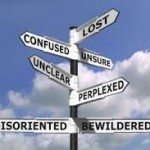
If you have friends, family or patients in these populations below who you think I might be able to help or if you have questions yourself, please feel free to reach out anytime:
- People in their 50’s, 60’s and 70’s waking up to their own sense of aging – often through illness or other changes in themselves or their loved ones. They seek answers, solutions, and guidance.
- Adult children of aging parents who feel confounded and frustrated about how to best help their parents through a myriad of difficult circumstances. They are the sandwich generation with aging parents, children and often grandchildren too.
- Families where adult children and aging parents need to and want to come to some new understandings and find a closeness now to the extent they can while they can still can.
- People in their 80’s and early 90’s who are facing their last years with all that that entails – memories, regrets, fears, peace and contemplation – all healthy parts of this stage of life. Having a genuinely caring nonjudgmental skilled listener is so valuable.
You might already know that there are very few psychotherapists in Marin who have advance training in gerontology. With my expertise in the fields of aging, communication, business, medicine and psychology, I am uniquely qualified to help your midlife and older patients, friends and family.
My offices are in Mill Valley and San Anselmo. Telephone appointments are also available for people who do not live close by. I provide a free initial phone consultation. And if I can’t help, I can often steer people to other beneficial resources.
With warm wishes for a peaceful 2016,
Nancy Rhine, MS, LMFT, CPG
415-378-6577
nrhine@gmail.com
Ageism in Modern America
While cruising Facebook this morning I came across an article posted by Paula Span, an author I respect so much for her insightful blog posts when she was featured as the writer for The New Old Age for the NY Times. Out of a budget cut, her weekly blog was cut but she still writes for the Times sometime and posts on her FB page. Here is the link to the article she posted which was written by the chief of geriatrics at Columbia University: America’s Bias Against Older Women Must Stop
The article has to do with the flurry of ageist comments in the media lately having to do with Caitlin Jenner. Not comments so much that were disparaging about her transformation from Bruce to Caitlin but comments that were denigrating of older women. Demeaning comments, snide jokes, general put-down’s about older bodies, in particular older female bodies.
This topic and more importantly this phenomenon is so widespread and so ubiquitous in our culture that it is overwhelming when considered. And that overwhelm can easily lead to increased poor self esteem on the part of older women, denial and fighting against “aging” thus the billions spent on anti-aging products, and depression. I see this depression so very commonly in my counseling work with older women, espeically those in their 60’s and 70’s.
There is a common thread of complaints under the heading of ageism whether we use that word or not. The experience is of: being the butt of disparaging and cruel jokes, feeling devalued, ridiculed, infantalized and invisible. of not counting, that they don’t matter.
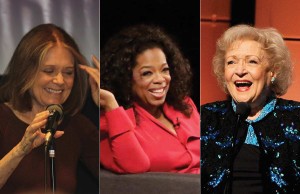 I wonder about our fear of women and women’s power in this culture. We women do have some kind of power when we are young and beautiful. Perhaps that is instinct that we are attractive when we can procreate. Perhaps we are also considered more valuable then because we “consume” therefore Wall St and the media value us. That doesn’t make much sense tho’ when you consider that older women and older people in general are big consumers and oh by the way voters as well.
I wonder about our fear of women and women’s power in this culture. We women do have some kind of power when we are young and beautiful. Perhaps that is instinct that we are attractive when we can procreate. Perhaps we are also considered more valuable then because we “consume” therefore Wall St and the media value us. That doesn’t make much sense tho’ when you consider that older women and older people in general are big consumers and oh by the way voters as well.
No, there is something intrinsic and deeply rooted in why this culture devalues older women to such an extent. More than they do older men although there is devaluing there too. Is it related to fear of mortality and fear of dying? Is it the fear of becoming superfluous and needy? We know that our culture puts huge emphasis on independence and me-ness. Cross interdependence is not a big part of our cultural tone. And/or does ageism towards older women have to do with latent resentment towards primary attachment figures who predominantly are mothers emerging later when our mothers or ourselves are now in a vulnerable position. Payback time in other words?
I believe that we lose out as a culture and a people when we do not value our older women and listen to what they have to teach us. Margaret Mead told a story about the old does of the red tail deer herds in Alaska. In times of drought or severe storms, it was the old does who had the memory of out of the way watering holes or sheltering cliff where they could find refuge from the storms. The herd rallied behind and old does towards safety.
I worry about this way we have of devaluing and demeaning our older women. We are in times of crisis. We need all the wisdom we can find. Denigrating and oppressing and discounting an entire segment of our population is anti-survival and anti-wisdom. I hope we can change. I hope that we boomers can push back against too-often-accept stereotyping and dismissing of older women. Our survival may just depend on it.
